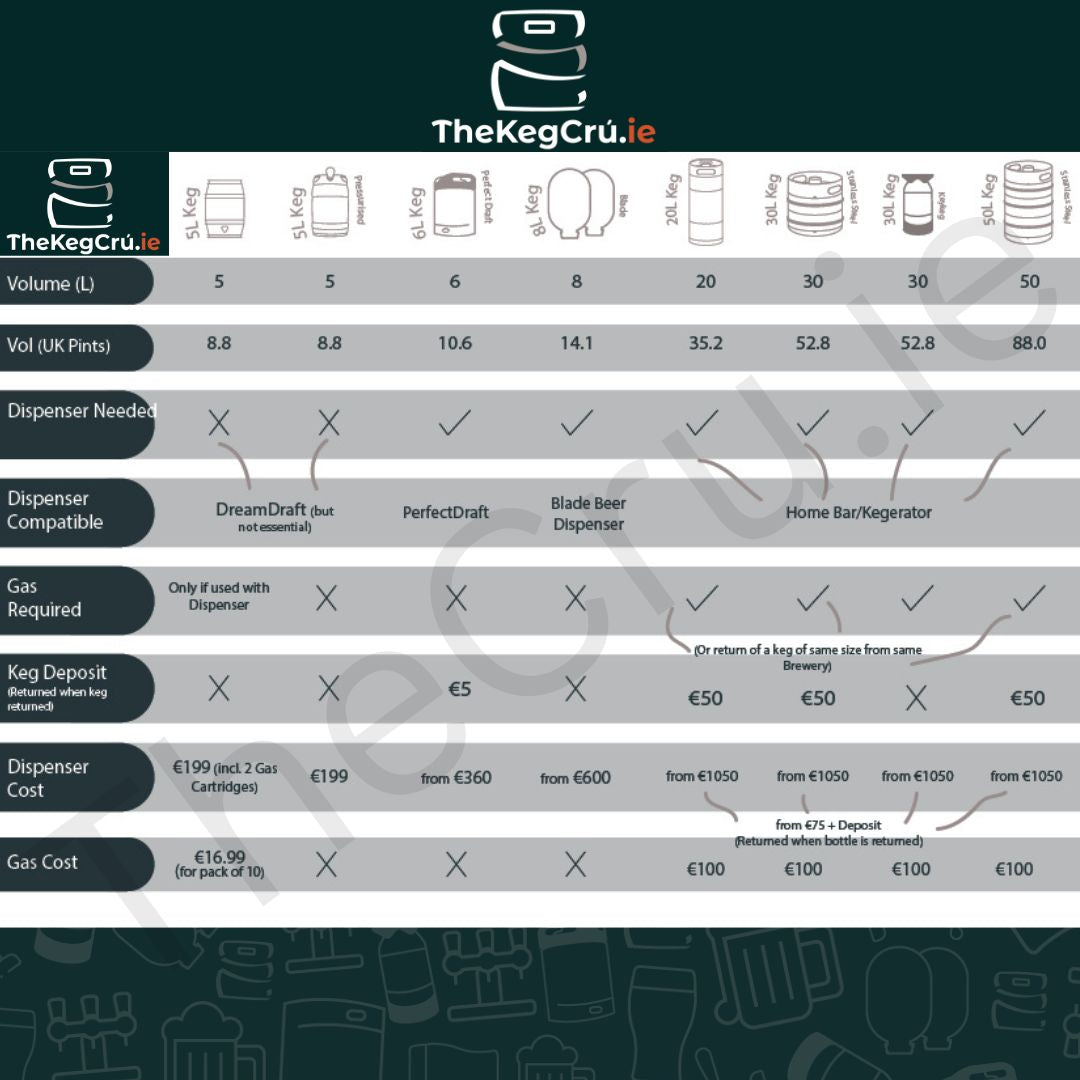
Beer Keg Volumes: Everything You Need to Know
Share
When planning an event or running a bar, understanding beer keg volumes is crucial for ensuring you have enough beer to keep everyone happy without overspending. This guide provides detailed insights into keg sizes, pint measurements, and how to calculate the volume of beer you need for any occasion.
Understanding Pint Measurements
In the UK, a pint is a standard measure of beer, and knowing how to convert between pints and millilitres is essential. A British pint is defined as 568 millilitres. This measurement is slightly larger than the American pint, which is 473 millilitres.
How Many Millilitres in a Pint?
A British pint equals exactly 568 millilitres. This is important for those serving beer to ensure they pour the correct amount. When considering how many pints you need for an event, converting this measurement into millilitres can help you better understand the total volume.
British (Imperial) Pint vs US Pint
The British pint, also known as the Imperial pint, and the US pint differ in volume. A British pint is 568 millilitres, while a US pint is 473 millilitres. This difference originates from historical measurements and has practical implications today. In the UK, beer servings are larger, which can impact consumption rates and keg calculations when comparing with American standards.
How Many Pints in a Keg?
To determine how many pints are in a keg, you need to know the keg's total volume and divide by the volume of a pint (568 ml). This calculation is straightforward and helps with ordering the correct keg size for your needs.
Standard Keg Sizes
There are several standard keg sizes available, each catering to different needs:
- 5-Litre Kegs
- 6-Litre PerfectDraft Kegs
- 8-Litre Blade Kegs
- 20-Litre Kegs
- 30-Litre Kegs
- 50-Litre Kegs
5-Litre Kegs
A 5-litre keg is a convenient option for small gatherings. It contains approximately 8.8 British pints (5000 ml / 568 ml). These kegs are easy to handle and store, making them ideal for home use.
PerfectDraft kegs are designed for use with the PerfectDraft machine. A 6-litre keg holds about 10.5 pints (6000 ml / 568 ml), offering a bit more beer without requiring significant storage space.
Blade kegs, used with the Blade countertop beer system, are perfect for home bars. An 8-litre keg contains around 14 pints (8000 ml / 568 ml), making it great for small to medium-sized gatherings.
Stepping up in size, a 20-litre keg holds about 35 pints (20000 ml / 568 ml). These kegs are suitable for larger events and can be used with various tapping systems.
A 30-litre keg provides around 52.7 pints (30000 ml / 568 ml). This size is often used by pubs and for sizable events where a significant amount of beer is needed.
The largest standard size, a 50-litre keg, contains approximately 88 pints (50000 ml / 568 ml). Ideal for busy bars and large events, these kegs ensure you have plenty of beer on hand.
Comparing Keg Sizes
Each keg size has its benefits and drawbacks. Smaller kegs like the 5L and 6L are easy to handle and store but need more frequent replacements. Larger kegs like the 30L and 50L are more efficient for high-volume serving but require more storage space and handling equipment.
Choosing the Right Keg Size
When choosing a keg size, consider factors like the number of guests, event duration, and available storage. Smaller kegs might be better for short events or smaller gatherings, while larger kegs suit extended events or venues with high turnover.
How to Store Beer Kegs
Proper storage is crucial for maintaining beer quality. Store kegs in a cool, dry place, ideally at a temperature between 3-5°C. Ensure kegs are kept upright to avoid sediment disturbance and spoilage.
Transporting Beer Kegs
Transporting kegs requires careful handling to avoid damage and maintain beer quality. Use keg trolleys or dollies for heavy kegs, and secure them during transport to prevent movement and potential injury.
Tapping a Keg
Tapping a keg correctly is essential for smooth beer dispensing. Follow these steps:
- Chill the keg to the appropriate temperature.
- Clean the tapping system thoroughly.
- Attach the tap to the keg securely.
- Open the CO2 valve to pressurize the keg.
- Pour a small amount of beer to clear any foam and ensure a smooth flow.
Calculating Beer Needs for Events
Estimate the amount of beer needed based on the number of guests and their drinking habits. A general rule is to plan for about 1.5 pints per person per hour, adjusting based on the event type and duration.
Environmental Impact of Keg Use
Using kegs can be more environmentally friendly compared to bottles or cans. Kegs reduce packaging waste and are often reusable, making them a sustainable choice for serving beer.
The Future of Beer Kegs
Innovations in keg technology continue to evolve. New materials and designs aim to improve sustainability, ease of use, and beer quality. Trends like smart kegs with monitoring systems are also emerging.
TheKegCru.ie Offerings
At TheKegCru.ie, we offer a wide range of keg sizes to suit any need. From small 5-litre kegs to large 50-litre options, we have the perfect solution for your event or business. Check out our special offers and comprehensive product range.
FAQs about Beer Keg Volumes
How many millilitres in a pint?
- A British pint is 568 millilitres.
How many pints in a keg?
- This depends on the keg size. For example, a 5-litre keg contains about 8.8 pints.
How many ml is a pint?
- A pint in the UK is 568 millilitres.
What is the largest standard keg size?
- The largest standard keg size is 50 litres, containing about 88 pints.
What is the smallest keg size available?
- The smallest standard keg size is 5 litres, containing about 8.8 pints.
How should I store my beer keg?
- Store kegs upright in a cool, dry place, ideally between 3-5°C.
Conclusion
Understanding beer keg volumes is essential for any beer enthusiast, event planner, or bar owner. By knowing how many millilitres in a pint and how many pints in a keg, you can better plan your beer needs, ensuring a great experience for your guests. Visit TheKegCru.ie for all your keg needs and expert advice on choosing the right size for any occasion.
